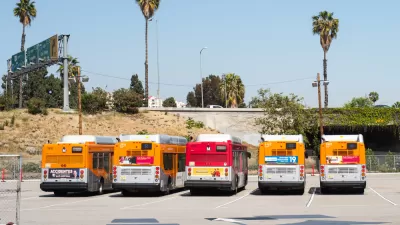The board of L.A. Metro voted Thursday to spend $138 million to purchase 95 electric buses plus chargers and wiring upgrades for two transit lines that now use natural gas buses, and approved a motion to convert all buses to battery-electrics by 2030

The Los Angeles County Metropolitan Transportation Authority (L.A. Metro) already has one of the cleanest bus fleets in the nations, with all 2,200 buses running on compressed natural gas (CNG) which emit less pollution than its diesel counterparts. Tailpipe emissions are expected to drop to zero by 2030 with the approval of a motion at the July 27 meeting, provided that the electric bus industry is able to manufacture buses that have greater ranges than the 95 buses they also agreed on Thursday to purchase.
At its meeting last month, the board agreed to purchase 295 buses that will be fueled with renewable natural gas. The board had been expected to purchase 35 electric buses at that meeting, but that was delayed to the July meeting.
The $138 million in contracts would be split between two manufacturers and used to convert two transit lines, report Laura J. Nelson and Emily Alpert Reyes for the Los Angeles Times. Note that the contracts also include chargers and wiring upgrades.
The board unanimously approved a $66-million budget to electrify the Silver Line, including buying 60 electric buses from BYD, installing chargers along the route, and updating wiring to handle higher wattages. The line should be finished by 2021, officials said.
Metro directors also voted to establish a budget of $72 million for replacing the Orange Line’s buses. That includes $51 million for 35 electric buses from New Flyer, and $7.8 million for charging stations at both ends of the line. The route should be fully electric by 2020, officials said.
In addition to the electric bus contracts, the board agreed to two contracts to upgrade and replace the existing compressed natural gas bus fleet, reports Steve Hymon for The Source.
- A contract was approved to purchase 65 60-foot CNG buses from New Flyer to replace buses purchased between 2004 and 2008 and go into service between 2018 and 2022. Staff report.
- A contract was approved worth up to $26.5 million with Cummins Engines for up to 395 ‘near zero emission’ CNG engines for existing buses. Staff report. [Also see June post on the meeting.].
"Though the technology has evolved in recent years, battery-powered buses still can’t travel as far as their natural gas-powered counterparts, which can run 400 miles on a tank," add Nelson and Reyes. "In a recent report, Metro employees said that electric buses as they exist today pose 'significant risks to service and operation.'"
However, the motion [jpg] the board approved Thursday was more optimistic on the technology and the role played by the agency:
Metro plans to spend nearly $1 billion on bus procurements in the next 10 years. That level of investment, coupled with a transition to all electric buses, presents an opportunity for LA County to demonstrate leadership on combatting climate change and can make Los Angeles the central marketplace for new electric bus technology...
Hat tip to Evan Gillespie.
FULL STORY: Metro agrees to buy 95 electric buses, in the first step toward an emissions-free fleet

Maui's Vacation Rental Debate Turns Ugly
Verbal attacks, misinformation campaigns and fistfights plague a high-stakes debate to convert thousands of vacation rentals into long-term housing.

Planetizen Federal Action Tracker
A weekly monitor of how Trump’s orders and actions are impacting planners and planning in America.

Chicago’s Ghost Rails
Just beneath the surface of the modern city lie the remnants of its expansive early 20th-century streetcar system.

Bend, Oregon Zoning Reforms Prioritize Small-Scale Housing
The city altered its zoning code to allow multi-family housing and eliminated parking mandates citywide.

Amtrak Cutting Jobs, Funding to High-Speed Rail
The agency plans to cut 10 percent of its workforce and has confirmed it will not fund new high-speed rail projects.

LA Denies Basic Services to Unhoused Residents
The city has repeatedly failed to respond to requests for trash pickup at encampment sites, and eliminated a program that provided mobile showers and toilets.
Urban Design for Planners 1: Software Tools
This six-course series explores essential urban design concepts using open source software and equips planners with the tools they need to participate fully in the urban design process.
Planning for Universal Design
Learn the tools for implementing Universal Design in planning regulations.
planning NEXT
Appalachian Highlands Housing Partners
Mpact (founded as Rail~Volution)
City of Camden Redevelopment Agency
City of Astoria
City of Portland
City of Laramie




























